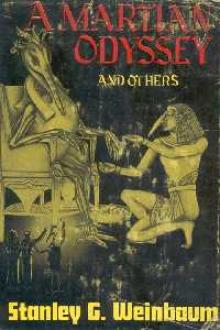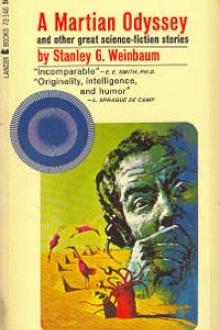Short Fiction, Stanley G. Weinbaum [chromebook ebook reader .TXT] 📗

- Author: Stanley G. Weinbaum
Book online «Short Fiction, Stanley G. Weinbaum [chromebook ebook reader .TXT] 📗». Author Stanley G. Weinbaum
He assumed a gruffness as the weary pair sat down. “You’re a fine looking couple!” he growled. “I should’ve known better than to let you wander off alone.” He paused. “Is your arm all right, Leroy? Need any treatment?”
Jarvis answered. “It’s all right—just gashed. No danger of infection here, I guess; Leroy says there aren’t any microbes on Mars.”
“Well,” exploded the Captain, “Let’s hear it, then! Your radio reports sounded screwy. ‘Escaped from Paradise!’ Huh!”
“I didn’t want to give details on the radio,” said Jarvis soberly. “You’d have thought we’d gone loony.”
“I think so, anyway.”
“Moi aussi!” muttered Leroy. “I too!”
“Shall I begin at the beginning?” queried the chemist. “Our early reports were pretty nearly complete.” He stared at Putz, who had come in silently, his face and hands blackened with carbon, and seated himself beside Harrison.
“At the beginning,” the Captain decided.
“Well,” began Jarvis, “we got started all right, and flew due south along the meridian of the Ares, same course I’d followed last week. I was getting used to this narrow horizon, so I didn’t feel so much like being cooped under a big bowl, but one does keep overestimating distances. Something four miles away looks eight when you’re used to terrestrial curvature, and that makes you guess its size just four times too large. A little hill looks like a mountain until you’re almost over it.”
“I know that,” grunted Harrison.
“Yes, but Leroy didn’t, and I spent our first couple of hours trying to explain it to him. By the time he understood (if he does yet) we were past Cimmerium and over that Xanthus desert, and then we crossed the canal with the mud city and the barrel-shaped citizens and the place where Tweel had shot the dream-beast. And nothing would do for Pierre here but that we put down so he could practice his biology on the remains. So we did.
“The thing was still there. No sign of decay; couldn’t be, of course, without bacterial forms of life, and Leroy says that Mars is as sterile as an operating table.”
“Comme le coeur d’une fileuse,” corrected the little biologist, who was beginning to regain a trace of his usual energy. “Like an old maid’s heart!”
“However,” resumed Jarvis, “about a hundred of the little grey-green biopods had fastened onto the thing and were growing and branching. Leroy found a stick and knocked ’em off, and each branch broke away and became a biopod crawling around with the others. So he poked around at the creature, while I looked away from it; even dead, that rope-armed devil gave me the creeps. And then came the surprise; the thing was part plant!”
“C’est vrai!” confirmed the biologist. “It’s true!”
“It was a big cousin of the biopods,” continued Jarvis. “Leroy was quite excited; he figures that all Martian life is of that sort—neither plant nor animal. Life here never differentiated, he says; everything has both natures in it, even the barrel-creatures—even Tweel! I think he’s right, especially when I recall how Tweel rested, sticking his beak in the ground and staying that way all night. I never saw him eat or drink, either; perhaps his beak was more in the nature of a root, and he got his nourishment that way.”
“Sounds nutty to me,” observed Harrison.
“Well,” continued Jarvis, “we broke up a few of the other growths and they acted the same way—the pieces crawled around, only much slower than the biopods, and then stuck themselves in the ground. Then Leroy had to catch a sample of the walking grass, and we were ready to leave when a parade of the barrel-creatures rushed by with their pushcarts. They hadn’t forgotten me, either; they all drummed out, ‘We are v-r-r-iends—ouch!’ just as they had before. Leroy wanted to shoot one and cut it up, but I remembered the battle Tweel and I had had with them, and vetoed the idea. But he did hit on a possible explanation as to what they did with all the rubbish they gathered.”
“Made mud-pies, I guess,” grunted the captain.
“More or less,” agreed Jarvis. “They use it for food, Leroy thinks. If they’re part vegetable, you see, that’s what they’d want—soil with organic remains in it to make it fertile. That’s why they ground up sand and biopods and other growths all together. See?”
“Dimly,” countered Harrison. “How about the suicides?”
“Leroy had a hunch there, too. The suicides jump into the grinder when the mixture has too much sand and gravel; they throw themselves in to adjust the proportions.”
“Rats!” said Harrison disgustedly. “Why couldn’t they bring in some extra branches from outside?”
“Because suicide is easier. You’ve got to remember that these creatures can’t be judged by earthly standards; they probably don’t feel pain, and they haven’t got what we’d call individuality. Any intelligence they have is the property of the whole community—like an ant-heap. That’s it! Ants are willing to die for their anthill; so are these creatures.”
“So are





Comments (0)